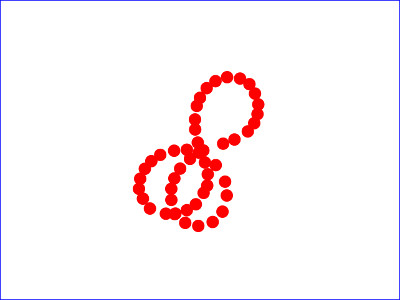Cyclobots
Try it online @ catseye.tc | See also: Chzrxl ∘ noit o' mnain worb

This is the reference distribution for Cyclobots, a dynamical system desk toy automaton thing put together by Chris Pressey in 1994. It consists of a number of virtual turtle robots called "cyclobots". Each cyclobot moves forward with a constant velocity, but constantly adjusts its trajectory to try to follow exactly one other cyclobot. No cyclobot is followed by more than one cyclobot.
A group of cyclobots tends to fall into one of several semi-stable patterns. The simplest of these is just a rotating circle, but more complex, trefoil-like patterns are common.
You can watch it online here: Cyclobots installation at catseye.tc.
To run it locally, clone this repository and open demo/cyclobots.html in a web browser such as Firefox. (Note that, if opened as a local file, the browser may fall back to canvas rendering; to ensure that WebGL is used, you can start a local server, but to be frank it doesn't seem to make much difference at this stage.)
The core behaviour is implemented in src/cyclobots.js and does not rely on PixiJS or any other display layer.
The PixiJS driver and visuals are defined in demo/cyclobots-pixi-launcher.js.
History
The first implementation of Cyclobots, now lost, was in Visual Basic 3.0, in 1994. (Let's call it version 1.0.) Some things it supported that subsequent implementations haven't yet replicated include:
- the cyclobots would collide with each other; a cyclobot would be unable to pass through another cyclobot.
- the user could click the left (or right) mouse button to attract (or repel) all the cyclobots towards (or away from) that point instead of each other.
In 2013, Cyclobots was re-implemented in Javascript, and this implementation resided in the HTML5 Gewgaws distribution. (Let's call this one version 2.0).
In 2019, this Javascript implementation was cleaned up and re-fitted to use PixiJS, and that is the version in this repository (which we will call version 2.1 or greater). Since PixiJS uses WebGL when possible, this version has the potential to have much nicer visuals than the previous versions; however, it is still a work-in-progress in this regard.
Commit History
@master
git clone https://git.catseye.tc/Cyclobots/
- Update links. Chris Pressey 2 years ago
- Assign some version numbers to the historical and current versions. Chris Pressey 4 years ago
- Add see-also bar at the top of the README. Chris Pressey 5 years ago
- Use dam-plus-widgets-web.js v0.1. Chris Pressey 6 years ago
- Convert demo to use DAM to build the UI. Chris Pressey 6 years ago
- Make forceCanvas button actually work. Chris Pressey 6 years ago
- Refactor so that we can force canvas without reloading the page. Chris Pressey 6 years ago
- Use pixi-viewport too, so we can scroll the bots back into view. Chris Pressey 6 years ago
- Select visuals with dropdown. Chris Pressey 6 years ago
- Checkpoint having a selection dropdown for kind of visuals. Chris Pressey 6 years ago